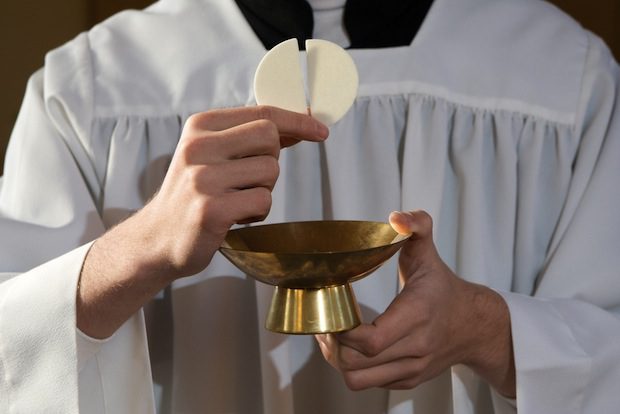Pope Cracks Door to Lutheran Communion

Francis continues to, um, amaze. From Rocco Palma’s report on the Pope’s meeting with Lutherans in Rome on Sunday, as part of an ecumenical dialogue:
In an answer that’s almost certain to resonate broadly across the ecumenical scene (and elsewhere, quite possibly show his hand on his intended course following last month’s Synod on the Family), the pontiff – clearly wrestling with the plea – pointedly appealed less to the standard prohibition of the Eucharist for Protestant communities than to the woman’s discernment in conscience.
As if to reinforce the point, in a move clearly decided in advance, Francis publicly presented the pastor with a chalice which appeared identical to the ones the Pope gave the archbishops of Washington, New York and Philadelphia during his late September US trip.
Quoting from his answer to a question posed by a Lutheran woman married to a Catholic man, about when she and her husband can expect to receive holy communion together (it is forbidden in the Catholic Church for non-Catholics — Orthodox Christians excepted under certain conditions — to receive communion):
I can only respond to your question with a question: what can I do with my husband that the Lord’s Supper might accompany me on my path? It’s a problem that each must answer [for themselves], but a pastor-friend once told me that “We believe that the Lord is present there, he is present” – you believe that the Lord is present. And what’s the difference? There are explanations, interpretations, but life is bigger than explanations and interpretations. Always refer back to your baptism – one faith, one baptism, one Lord: this Paul tells us; and then consequences come later.
I would never dare to give permission to do this, because it’s not my own competence. One baptism, one Lord, one faith. Talk to the Lord and then go forward. [Pauses] And I wouldn’t dare – I don’t dare say anything more.
In other words: let your conscience be your guide. Who is the Pope to judge?
It is not in the competence of the pontiff of the Roman Catholic Church to say that a Protestant cannot receive communion in a Catholic mass? Really? The Catechism of the Catholic Church says:
1400 Ecclesial communities derived from the Reformation and separated from the Catholic Church, “have not preserved the proper reality of the Eucharistic mystery in its fullness, especially because of the absence of the sacrament of Holy Orders.” It is for this reason that, for the Catholic Church, Eucharistic intercommunion with these communities is not possible. However these ecclesial communities, “when they commemorate the Lord’s death and resurrection in the Holy Supper . . . profess that it signifies life in communion with Christ and await his coming in glory.”
“Eucharistic intercommunion with these communities is not possible” is now “One baptism, one Lord, one faith. Talk to the Lord and then go forward.”
Of course he “would never dare to give permission to do this,” the Jesuit pope said, Jesuitically, but said so in winking at doing that very thing. Hard to avoid the conclusion that Pope Francis just effectively rewrote the Catechism, and destroyed a Eucharistic discipline that has existed since the Reformation. Did you ever think you would live to see this? The Pope is refuting the magisterial teaching of his own Church, and not on a small matter either.
The Catholic anthropologist Mary Douglas, in her celebrated 1968 book Natural Symbols, writes:
Now I turn to the other example of how messages about symbols issue from the Vatican only to be decoded here [England] as messages about ethics. The celebration of the Eucharist is central to Catholic dogma. If this gets bowdlerized, then the tendency which Herberg describes for denominations to become social compartments empty of distinguishing empty of distinguishing doctrines will have worked its way right through the modern world. Historic, sacramental Catholicism will have faded out.
She goes on to talk about how the condensation of symbols in the Catholic Eucharist is “staggering in its depth.” Says Douglas, “If it were just a matter of expressing all these themes, symbolizing and commemorating, much less blood and ink would have been spilt at the Reformation.
She talks about how Catholics view the Eucharist as being, for Catholics, a “real, invisible transformation” of bread and wine into the Body and Blood of the deity, and this having “saving efficacy for those who take it and for others.
It is based on a fundamental assumption about the human role in religion. It assumes that humans can take an active part in the work of redemption, both to save themselves and others, through using the sacraments as channels of grace — sacraments are not only signs, but essentially different from other signs, being instruments. This touches on the belief in opus operatum, the efficacious rite, whose very possibility was denied by the Protestant reformers.
Douglas, quoting a scholar of the Reformation, says that the Reformation’s most powerful effect was to turn Christianity into a religion of inner feeling. It did that not by toppling the Pope, but by changing the sacramental system. “For the Catholic Church, it was not the attack on the Papacy that was the most fateful event which has happened in the Reformation, but the emptying out from her Mysteries of the objective source of power.”
And yesterday, the Pope — the Pope! — told a Lutheran woman to “come forward” because “life is bigger than explanations and interpretations.”
Poor historical, sacramental Catholicism…